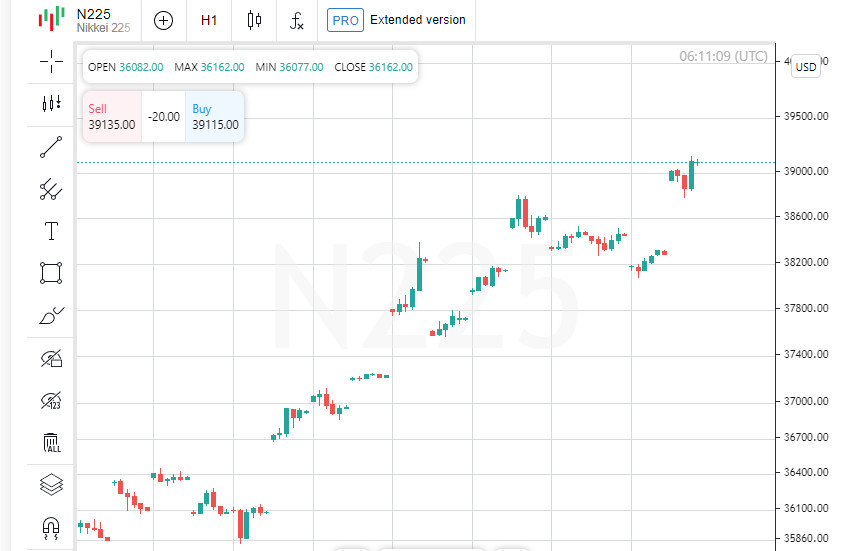
A landmark milestone was recorded in the Japanese stock market on Thursday: the Nikkei average breached the threshold set in December 1989, thanks to a significant rise in the share prices of companies operating in the microelectronics sector. This leap was driven by the superior earnings forecasts of American chip giant Nvidia, surpassing market expectations.
The Nikkei index reached 39,029.00, updating the historical high of 38,957.44 set on the last trading day of 1989, when the Japanese economy was at the peak of the "bubble." This was made possible by low asset valuations and corporate reforms, which attracted the attention of foreign investors looking for alternatives to weakening Chinese markets. Since January 2023, the index has jumped by 52%, showing impressive growth.
It took 34 years to recover from the downturn, a record period for a major market, surpassing Wall Street's recovery from the Great Depression by ten years.
To date, the index has shown a growth of almost 17% after a 28% increase in 2023, leading among major Asian exchanges. While the Nasdaq technology index grew by 43% last year and by 6% this year.
The Nikkei rally successfully resists recession in Japan, military conflicts in Europe and the Middle East, global inflationary pressure, and rising interest rates worldwide. Trading activity and a weak national currency contributed to increased exporter revenues, protecting the market from a decline in domestic demand.
The implementation of corporate reforms in Japan, including share buybacks and reduction of cross-shareholdings, as well as foreign investments such as Warren Buffet's significant investments in 2020, highlighted the attractiveness of valuations and contributed to the rally. Last year, the Japanese stock market received 6.3 trillion yen ($42 billion) in foreign investments, and in January of this year, 1.16 trillion yen.
The success of the Japanese market at the beginning of 2024 was also due to a strong earnings season, a drop in the yen's value, and expectations that the Bank of Japan will continue its ultra-loose monetary policy. Analysts raised their year-end forecasts from 35,000 to 39,000, noting the potential for further growth.
Comparing the current market situation to the boom of the 1980s and the subsequent crash, which led to a prolonged period of deflation, there is no fear of a new crisis today, as inflation is controlled at just over 2%, and company incomes continue to grow.
Companies like Fast Retailing Co (owner of Uniqlo), chipmakers Advantest Corp and Tokyo Electron have become the backbone of the current rally, unlike past decades when bank and real estate stocks were in focus.
The growth of the Japanese market is also supported by robust corporate reforms and opportune timing for growth amidst a downturn in China. While the Nikkei index is on the rise, indexes in Hong Kong and China are experiencing a downturn, attracting investments to Japan.
Corporate cash reserves and household savings in Japan also have the potential to stimulate stock price growth, encouraging their entry into the market.
A 6% increase in Nvidia shares after a revenue forecast exceeding expectations highlighted the company's steady demand for chips, becoming a key factor for the market. Shares of Tokyo Electron and Advantest, along with other companies in the microelectronics sector, showed significant growth, contributing to the overall success of the Nikkei index and demonstrating a healthy dynamic in the industry.
 English
English 
 Русский
Русский Bahasa Indonesia
Bahasa Indonesia Bahasa Malay
Bahasa Malay ไทย
ไทย Español
Español Deutsch
Deutsch Български
Български Français
Français Tiếng Việt
Tiếng Việt 中文
中文 বাংলা
বাংলা हिन्दी
हिन्दी Čeština
Čeština Українська
Українська Română
Română

